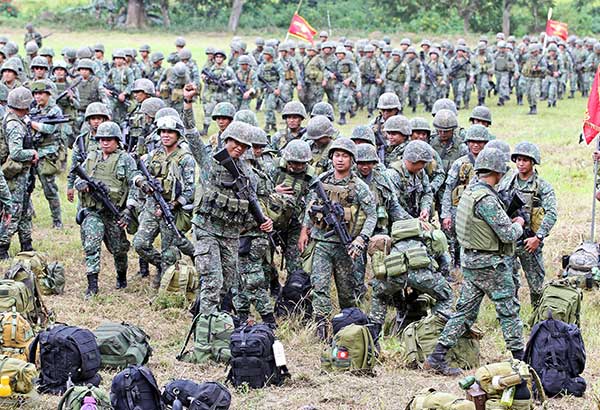Heroes


One year ago, fighting broke out in Marawi City after troops tried to serve a warrant of arrest on Isnilon Hapilon, the ISIS “emir” for all of Southeast Asia.
Hapilon, it turned out, infiltrated a small army of militants into the city with plans for its takeover. The militants had impressive firepower and enough ammunition to fight a long siege.
After the initial skirmish that saw government forces withdrawing in the face of superior numbers, the militants quickly occupied strategic points in the city. What followed was a siege that lasted over five months. The bloody battle for Marawi cost about 1,500 lives, nearly a thousand of them from the side of the Maute forces.
President Duterte, the other day, took responsibility for the obvious failure in intelligence. A small army of about a thousand militants managed to infiltrate the city under the military’s nose, brought in heavy arms and ammunition, and stockpiled large amounts of food.
The military warns us about “sleeper” cells of ISIS-affiliated fighters. But a force as large as that assembled for occupying Marawi will be tough to replace. The Maute brothers invested years and a lot of money assembling that force and executing the deployment. The ISIS is now a depleted force globally and the counter-terrorism effort has vastly improved its methods.
Still, many inconvenient questions remain unanswered. How was it possible for such a substantial deployment of militants to happen without the neighbors noticing – and reporting the build-up to the authorities?
The fighting devastated a large swathe of Marawi. This is how urban warfare looks like. We have seen this sort of devastation elsewhere, in the great cities of Syria ruined by the civil war.
The most current estimate puts the cost of rehabilitating the damaged sections of Marawi at P88 billion. The team on the ground seems to be doing a good job at rebuilding the place. But they can never restore the city’s charm. Its innocence lost, Marawi will never be the same.
One year after the onset of fighting, about 230,000 residents remain displaced. Pesky questions about who owns which piece of land will likely slow the rehabilitation effort. Marawi is notorious for its bad land documentation. It turns out, a large part of the battle area remains legally a part of the military reservation.
Anniversary
For purposes of unveiling the detailed designs for rebuilding the city, ceremonies were organized to mark the first anniversary of the onset of hostilities. While some officials did gather in the city, President Duterte stayed in Manila.
Presidential Assistant Bong Go explained that the President sees no point in commemorating the onset of hostilities. He assured the President will be in the city on the first anniversary of its complete liberation from the militants. He has a point.
When the anniversary of the city’s liberation comes around, we hope the focus of the ceremonies will be more on the heroes who sacrificed so much and less on the construction details of the rehabilitation plan.
About 150 members of our armed forces perished in that battle. Over 1,700 soldiers were wounded. Our army did its job bravely and paid the cost of war dearly.
Our people do appreciate the courage and professionalism of our fighting men. When the units deployed to Marawi returned to their home bases, people in the streets applauded them.
Five months from now, our Marawi heroes will hopefully be more fittingly honored. There are many more stories of valor, many more tales of selfless courage, needing to be told.
We look forward to the anniversary of the battle’s end. The performance of our soldiers did us proud.
Misstated
Roque did make it sound that government might roll back excise taxes on fuel if international oil prices touch the $80 per barrel mark. That creates so much unwarranted expectation. He should go back and closely read the letter of the TRAIN law.
This is how the law reads: “For the period 2018 to 2020, the scheduled increase in the excise tax on fuel as imposed in this Section shall be suspended when the average Dubai crude oil price based on the Mean of Platts Singapore (MOPS) for three months prior to the scheduled increase of the month reaches or exceeds USD 80 per barrel.”
Even that allowance on prospective escalation on the fuel excise tax is subject to some conditions. To wit: “Provided, that the Department fo Finance shall perform an annual review of the implementation of the excise tax on fuel and shall, based on projections provided and recommendations of the Development Budget Coordination Committee, as reconciled from the conditions as provided above, recommend the implementation or suspension of the excise tax on fuel: Provided, further, that the recommendation shall be given on a yearly basis: Provided, finally, that any suspension of the increase in excise tax shall not result in any reduction of the excise tax being imposed at the time of the suspension.”
That is an exhausting sentence. But Harry, being a lawyer, should be able to read and understand it.
He should not make people expect that the excise tax could be whimsically withdrawn once global oil prices touches $80. The law provides that only future escalations in the excise tax could be suspended, not the excise tax rate already in effect.
Harry is fond of repeating that Roman aphorism: The law is harsh, but it is the law. He should do that now.
- Latest
- Trending























